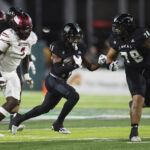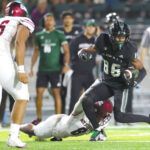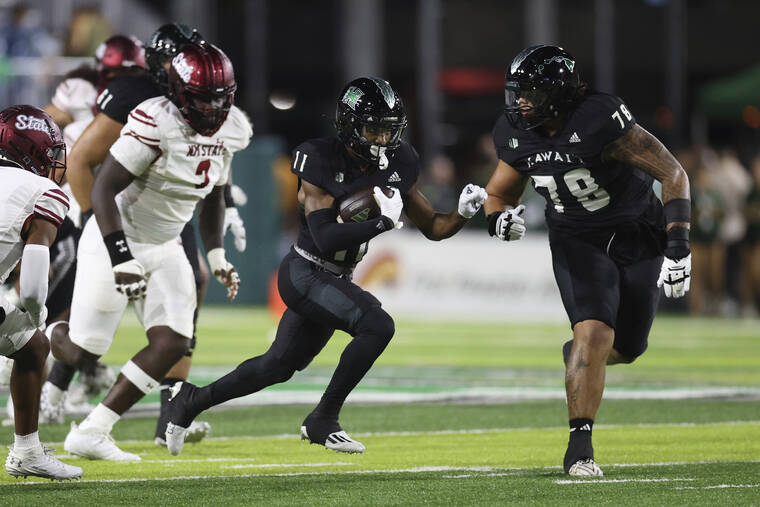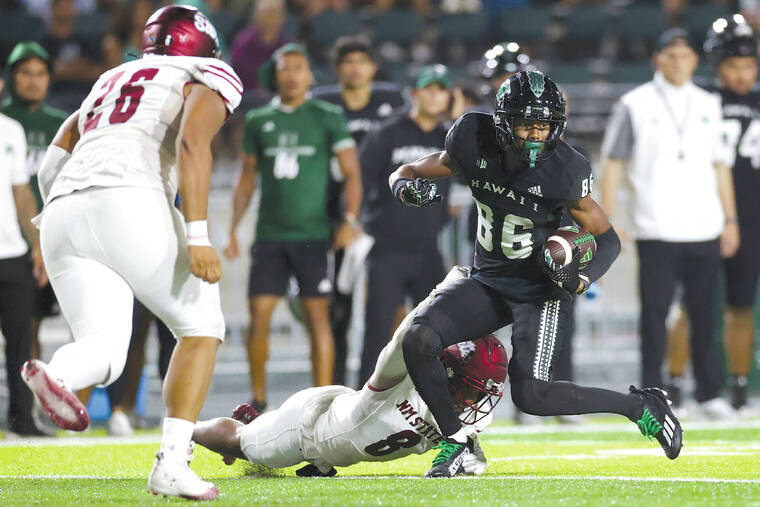Wednesday was getaway day. But long after most of the Warriors left the Ching Complex to prepare for that afternoon’s departure to Las Vegas, quarterback Brayden Schager and wideout Jalen Walthall worked on a deep-post play that failed against New Mexico State. Walthall caught the other six passes Schager threw his way in that game.
“We wanted to get it right, ” Schager said of the post-practice session.
Schager and Walthall formed a connection after both committed to UH nearly three years ago. In the spring ahead of their freshman season, Schager asked to join Walthall’s 7-on-7 team. Their team won the tournament. Now Walthall, who has started the past two games, has emerged as key contributor in the revised four-wide offense, which relies on receivers reading coverages and connecting with Schager.
In resurrecting the run-and-shoot, head coach Timmy Chang initially wanted the option of a tight end as one of the four receivers to boost the run game when defenses employed three D-linemen and three safeties. But Greyson Morgan was the only tight end prototype on the active roster, and he missed two games because of an ailment. (At 6-4 and 205 pounds, Devon Tauaefa is viewed more as a receiver.)
The departure of Morgan, who entered the transfer portal this week, will lead to the Warriors going with true four-receiver sets. Slotback Koali Nishigaya, who played in this system at Saint Louis School, has caught 73.9 % of the passes when targeted. He is at his best on quick cuts and crossing patterns.
Schager has connected on 84.6 % of short passes to the middle the previous two games. With four-receiver sets in the second half last week, Schager was 18-for-25 for 199 yards (after going 8-for-13 for 46 yards in the first half ). UH held possession for 21 :46 after the intermission.
Rainbow Warriors defense
The interior linemen—nose tackles and 3 techs—are interchangeable but diverse. There is power (starters John Tuitupou and Kuao Peihopa ), hands of fury (Ezra Evaimalo ), low-leverage strength (Anthony Sagapolutele and Foi Sila ) and 5-11, 330-pound Daniel “Sauce ” Williams. Williams can bench-press 500 pounds, is learning to speak Samoan (to exchange line calls covertly with Tuitupou ), and has developed a palate for local cuisine. The Trinity Valley College transfer was in the weight room when he noticed teammates drinking juice.
“Coach Kody (Cooke ) said it’s the best sugar water you’ll ever have, ” recalled Sauce, who then drank a gallon of POG. He also fell in love with musubi and loco moco.”I love it all, ” he said.
Against New Mexico State, he ripped the football free from running back Storm Thomas’ grip and raced 41 yards the other way. With a receiver in pursuit, Williams veered and crashed into NMSU quarterback Diego Pavia.
“He was shaken up real bad, ” Williams said. “He just grunted real bad. He had to fix his helmet.”
Before the hit, Pavia rushed eight times for 91 yards ; after that, he gained 12 yards on three non-sack carries. Williams said he plays with the same youthful enthusiasm as he did with “side kill “—tackle football in a congested front yard in San Antonio.
“Make it to the other side, ” he said of the rules. “Running, no pads, just kids having the time of their lives.”
Rainbow Warriors specialists
Kickoffs, like belt-high fastballs, should never be delivered down the middle. That was Ben Falck’s lesson when his first kickoff of the season—to the middle—was returned 97 yards for a touchdown.
“I tell him all the time, ‘Don’t let one bad kick scare you into another one, ‘” special teams coach Thomas Sheffield said.
It didn’t. All but three of Falck’s next 17 kickoffs were touchbacks or fair catches. He also successfully converted an onside kick last week.
“I like when you work hard and get the right answer, ” said Falck, a former mathlete who earned a degree in mathematics. “In relation to football, you work hard, and when you get the answer, it’s satisfying, like solving a puzzle.”
Rebels offense
In 2017, 45-point underdog Howard beat UNLV in the biggest oddsmaker upset in NCAA history. After several ensuing coaching stops—including a year at UH as receivers coach—former Howard offensive coordinator Brennan Marion and his Go-Go offense are averaging 34 points per game in UNLV’s 3-1 start.
The no-huddle attack is designed for speeds up to 14 seconds per play, with a goal of 70 plays per game. From unique formations—two backs aligned to the side of the quarterback or three receivers bunched on the narrow side of the field—there are simultaneous horizontal movements and vertical routes in a divide-and-conquer approach. Doug Brumfield, who has not played since being rocked three times in a five-play sequence two weeks ago, reportedly returned to practice this week.
But Hawaii-born Jayden Maiava is 2-0 as Brumfield’s replacement. Maiava was a Kaimuki High standout as a junior before moving to Las Vegas and playing for Liberty High, whose OC at the time was former UH quarterback /safety Chad Kapanui.
At 6-4 and 220 pounds Maiava is a dual threat. Jai’Den “Jet ” Thomas (seven rushing TDs as a freshman ), Vincent Davis (7.8 yards per carry ), Courtney Reese and Donavyn Lester split the ground work. In some two-back plays, one will sprint across the formation while the other will go upfield.
Marion also is fond of calling for split-run plays with a back going one way and the QB with the option of following pullers the other way. Wideout Ricky White is the deep threat and slotback Jacob De Jesus, a former UPS worker, of course, is a gifted route runner.
Rebels defense
As the son of dentists, Jackson Woodard is used to hearing “Say, ahh.” As a do-everything linebacker, Woodard is used to drawing oohs and ahhs. Woodard, who leads the Rebels in total tackles (32 ) and solo stops (18 ), often sets up in the middle, 3 to 5 yards from the line, for a panoramic view. He can zip to the flats, attack a back emerging from a run gap, or pressure the quarterback.
The Rebels, who are skilled at delayed blitzes, have a play in which a D-end crashes diagonally, like a trap block, opening a path for Woodard or linebacker Marsel McDuffie.
“Physicality, ” Woodard said, “I think that’s what this game is made of. At the end of the day, if you can describe this game, I think it’s a physical game.”
Woodard always admired his brother, who was two years older.
“When he started playing padded football, at 7 or 8, I wanted to play, ” said Woodard, who began with flag football at 5.
Since then, Woodard admitted to being “obsessed with (football ).
“That’s all I do. That’s all I think about. That’s all I want to do. It’s something that you always can continue to get better at. It’s a physical game, and I love physicality.”
Woodard, who grew up in Little Rock, joined Arkansas as a walk-on. He eventually earned a scholarship.
“I didn’t go up there to get a scholarship, I went there to play, ” said Woodard, who entered the transfer portal at the end of the 2022 season.
When Barry Odom, who was Arkansas’ DC the past three years, accepted UNLV’s head coaching job, Woodard decided to join the Rebels. He is a kinesiology major with an emphasis on pre-dental. And the future dentist dutifully wears a mouthpiece.
“I try to keep the teeth clean and intact, ” he said.
Rebels specialists
At the end of the spring game, slotback /returner Jacob De Jesus proposed to his girlfriend. It was the last time he took a knee on a football field.
De Jesus is a diligent receiver—he studies videos of the NFL’s Justin Jefferson and Stefon Diggs, then mimics their moves in the park or on the field—and a fearless returner. He averages 31.5 yards on kickoff returns, 11.8 yards on punt returns. He also is an indefatigable worker.
”It’s definitely tough being a father, a student and a football player, ” said De Jesus, who worked at UPS in junior college. “It was hard work, but I had a baby on the way, and I wanted to make sure she was taken care of.”






